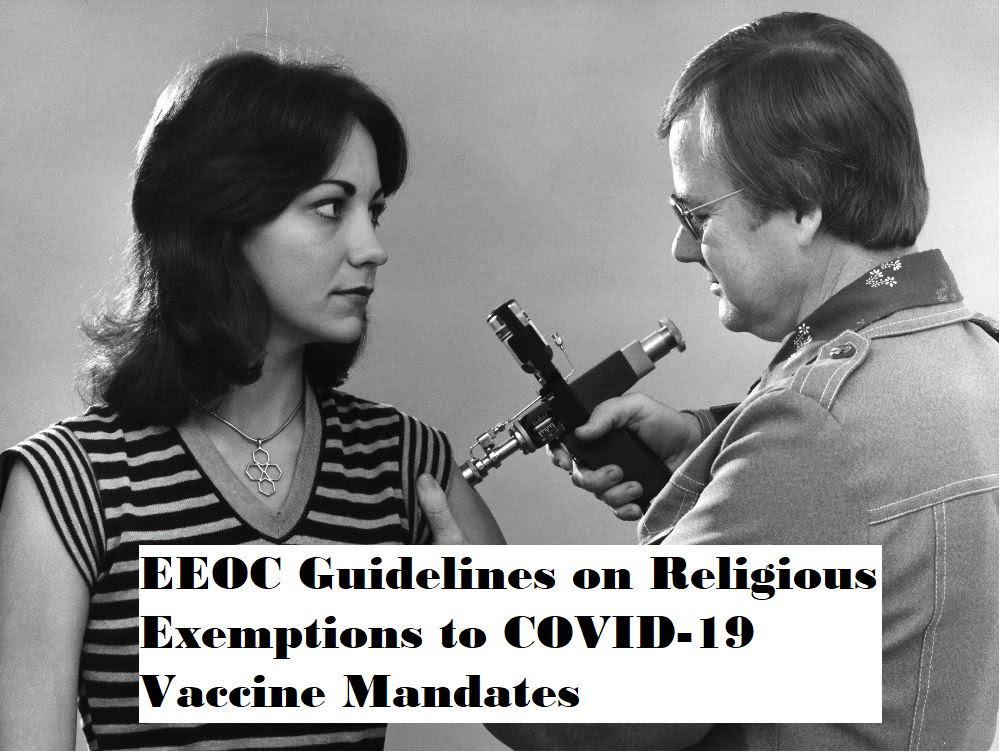Late last month, the EEOC updated its Frequently Asked Questions (FAQs) to include a new section discussing religious objections to COVID-19 vaccine mandates.
These guidelines specify that to request a religious exception to a COVID-19 vaccination requirement, the employee is not required to use any “magic words.”
Employees do, however, need to notify their employers that there is a conflict between their religious beliefs, practices or observances and the vaccination requirement.
To assist employers and employees, the EEOC has shared its own internal form for religious-exemption requests.
The EEOC also states that while an employer should generally assume that a request for religious accommodation is based on sincerely held religious beliefs, when an employer has an objective basis for questioning either the religious nature or the sincerity of a particular belief, the employer can make a limited factual inquiry to seek supporting information.
If an employee fails to cooperate with an employer’s reasonable request for verification of the sincerity or religious nature of the employee’s belief, that employee risks the loss of any subsequent claim that the employer improperly denied an accommodation.
The EEOC points out that the definition of “religion” under Title VII protects nontraditional religious beliefs, but it does not protect social, political, or economic views, or personal preferences.
This means that objections to COVID-19 vaccination based on social, political, or personal preferences, or on nonreligious concerns about the possible effects of the vaccine, do not qualify as “religious beliefs” under Title VII.
While an employee’s sincerity in holding a religious belief is “largely a matter of individual credibility,” the EEOC guidelines note that factors that – either alone or in combination – might undermine an employee’s credibility include:
• whether the employee has acted in a manner inconsistent with the professed belief (although employees need not be scrupulous in their observances);
• whether the accommodation sought is a particularly desirable benefit that is likely to be sought for nonreligious reasons;
• whether the timing of the request renders it suspect (e.g., it follows an earlier request by the employee for the same benefit for secular reasons); and
• whether the employer otherwise has reason to believe the accommodation is not sought for religious reasons.
In these situations, the employer is permitted to ask the employee for an explanation of how the employee’s religious belief conflicts with the employer’s COVID-19 vaccination requirement.
The EEOC goes on to indicate that while prior inconsistent conduct is relevant to the question of sincerity, an employee’s newly adopted or inconsistently observed practices might still be sincerely held.
In other words, an employer shouldn’t assume that an employee’s belief is insincere simply because some of the employee’s practices deviate from the commonly followed tenets of the employee’s religion, or because the employee adheres to some common practices but not others.
No one factor or consideration is determinative, and employers should evaluate religious objections on an individual basis.
Even if an employee would otherwise be entitled to an exemption, there are situations when it would be an “undue hardship” to accommodate an employee’s request for religious accommodation.
According to the EEOC, before determining that an exemption is an undue hardship, an employer should thoroughly consider all possible reasonable accommodations, including telework and reassignment.
If, however, an employer is unable to reasonably accommodate an employee’s religious belief without an “undue hardship,” the employer is not required to provide the accommodation.
The new guidelines note that the Supreme Court has held that requiring an employer to bear more than a minimal cost to accommodate an employee’s religious belief is an undue hardship.
Courts have found Title VII undue hardship where, for example, the religious accommodation would impair workplace safety, diminish efficiency in other jobs, or cause coworkers to carry the accommodated employee’s share of potentially hazardous or burdensome work.
Costs to be considered include not only financial costs but the burden on the conduct of the employer’s business – including the risk of the spread of COVID-19 to other employees or to the public.
Relevant considerations during the COVID-19 pandemic include, for example, whether the employee requesting a religious accommodation to a COVID-19 vaccination requirement works outdoors or indoors, works in a solitary or group work setting, or has close contact with other employees or members of the public (especially medically vulnerable individuals).
Another relevant consideration is the number of employees who are seeking a similar accommodation, that is, the cumulative effect of granting accommodations to multiple employees.
The EEOC guidelines provide that when there is more than one reasonable accommodation that would resolve the conflict between the vaccination requirement and the sincerely held religious belief without causing an undue hardship, the employer is not obligated to provide the accommodation preferred by the employee.
The EEOC reminds employers and employees that changing circumstances may mean the employer has the right to discontinue a previously granted accommodation if it is no longer used for religious purposes or if it subsequently poses an undue hardship on the employer’s operations.
Please feel free to contact us if you have any questions about the above or if you need assistance with any other employment related legal issues.
For more information about employment law, see Employment Law (in Plain English)®, co-authored by members of this law firm. The book is available through Skyhorse Publishing, Amazon, Barnes & Noble, Powell’s Books, and Bookshop (an online bookstore that allows you to support your favorite independently owned bookstore).
Photo by CDC on Unsplash






